#some fantasy manga I love:
Explore tagged Tumblr posts
Text
I recently got a bookstore gift card for graduation, and I was wondering if anyone had any good fantasy recommendations? I tend to like stuff by authors such as Tamora Pierce, Naomi Novik, Trudi Canavan, Shannon Hale, but I've also enjoyed some Madeline L'Engle (I know she's more SF than fantasy) and Dianne Wynn Jones. I also recently read a book by Foz Meadows, who's title escapes me now, that I also enjoyed. I'll take recommendations in other genres as well, but fantasy tends to be my favorite, and I'd love to get a new book or author to dive into!
#I also like other books and authors#and am happy to list more off if that helps people#i just didn't want to fill the post with them#looking for recommendations#fantasy#books#oh if it helps#some fantasy manga I love:#Basara#Akatsuki no Yona#Bokura no Kiseki#Akagami no Shirayukihime#mostly I guess I like strong female leads#but not all of them have female leads so that's not prohibitive#i just tend towards them I guess#and I'm always fine with multiple pov books#love it to get different peoples perspective on a situation#The High Lord is my favorite book out of the authors listed#and usually my favorite characters are the guys even when it's female led#so dunno what that says bout me#Oh and FMA of course for manga#I'm enjoying her new one too
10 notes
·
View notes
Text

i've been completely charmed by witch hat atelier♡
(art prints)
#witch hat atelier#guys... i had been meaning to read this for so long and i'm so mad that it took me forever to start#but omg i'm SO glad to be finally here now😭😭😭💖💖💖#this story is so special😭😭🥺🥺 i love everything about it so much#found family+queer+fantasy are my top 3 story themes ever it's like this manga was made for me... plus the old fairytale art style omg#every page is stunning... genuinely some of the most beautiful art i've seen in my life#consistently spectacular composition & gorgeous character design throughout the entire thing it's so amazing#shirahama kamome is incredible the work she's doing here is seriously amazing on every level#the story is so good and deep and heartfelt and the bond between the 6 main characters is my favorite thing ever😭 that's a family!!!!!!#it's a masterpiece i'm so serious please go buy it and read it. if you like the same things as me you're going to love it#i'm so excited to see where the story goes next and to watch the anime next year🥹🥹#witch hat atelier fanart#qifrey#coco#qifrey witch hat atelier#coco witch hat atelier#wha#wha fanart#illo#illustration#artists on tumblr#green#blue#atelier of witch hat
595 notes
·
View notes
Text
Holy mother of Chilchuck and Marcille and marchil-



I don't wanna think about my father dyin' I don't wanna hear my mother cryin' I don't wanna look into the mirror tryin' not to lose my shit Flowin' like lava down the side of a mountain Man in the jungle lookin' for a fountain of youth But he knows that fountain won't appear... fear If it all ends tomorrow I had a blast It looked so beautiful And it hurt so bad What a real good time What a heartfelt world What a fucked up place Searchin' for knowledge Walkin' through fire Man in a garden filled with desire I know my name ain't written in your book... look If it all ends tomorrow I had a blast It looked so beautiful And it hurt so bad What a real good time What a heartfelt world What a fucked up place What a real good time What a heartfelt world What a fucked up place




It’s literally got everything it’s just marchil at the end my god. Death, fear of death & aging, resignation, cheery "whatever, as long as I had a good time!", looking at the world both with romantic glasses and harsh realistic cynicism.……….. The way the first verse can apply to both of them… I am deceased
#Spotify was playing random songs i heard that first lyric and immediately I was honed in#It’s got IT ALL LIKE ARE YOU KIDDING ME#Shoots straight up to my top marchil songs my god my fucking god oh my god#Marchil#chilchuck tims#marcille donato#music sharing#3rd verse gives dunlord marci oughhh insane how some verses are clearly chil and others marcille. AND IT’S A DUET#HE SINGS IT AND SHE CHIMES IN HERE AND THERE BC HER ARC IS DONE AND SHE’S RESIGNED#I’ll get out my marci n chil arc analysis by god. I need to draw marchil dancing asap my god#When I say marchil cracked the meaning of life 2 me this is what I mean btw. Wdym live in the moment and let in love and balance in outlook#First but assuredly not last time i shove that warg panel in everyone’s faces#Spoilers#dungeon meshi manga spoilers#Mini web weaving#it wasn’t meant to be but i kept adding pics#Hey what if you taught me about hope again and I taught you to not escape into fantasies…#What if you were too glass half-full and i was too glass half-empty… And together we could make a full glass……….#Dungeon meshi
96 notes
·
View notes
Text
anyway since my hq!! hyperfixation has reared its head around once more, i shall remind u all of one thing:

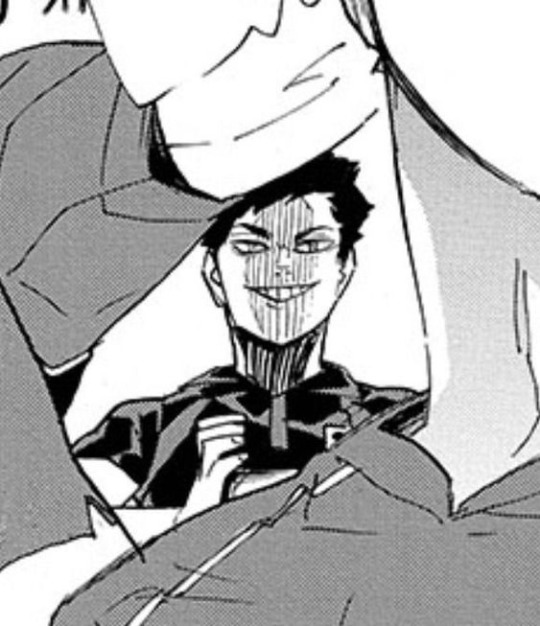
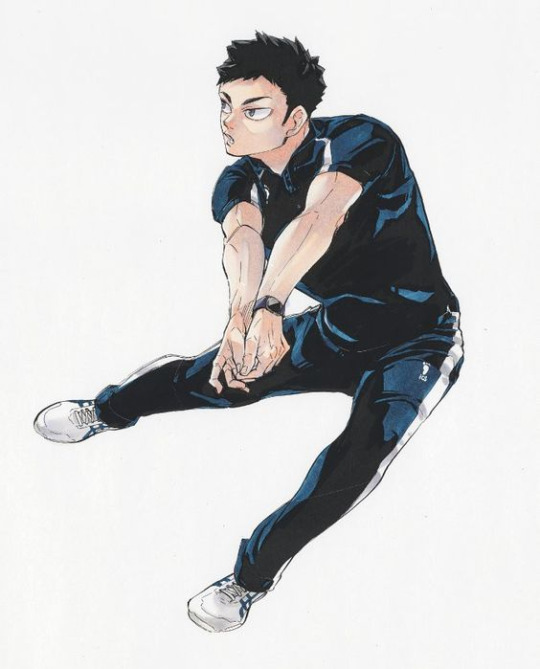
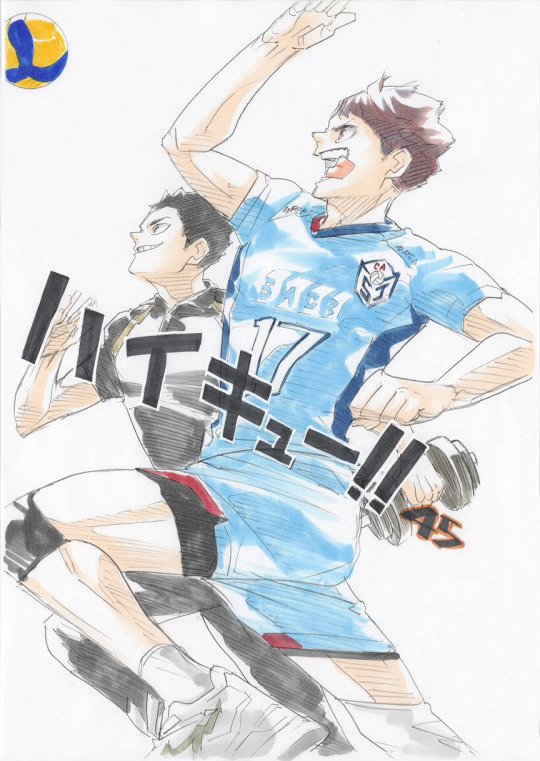
iwaizumi hajime (27) athletic trainer (+ argentina player oikawa tooru)
#sophie's idle chatter#...........my brain chemistry went through a complete and utter overhaul when the timeskip happened in the manga#ESP WAKATOSHI LIKE OURGHGKD#AND OFC WASHIO TATSUKI AND ONIGIRI MIYA OSAMU#and the whole iwaizumi and wakatoshi meet up in usa.... sobs.... and when iwa sent their selfie to oikawa.... sobs again....#i love hq!! its genuinely such a comfort anime/manga for me like good lord#my pinterest made me cry seeing them in the timeskip again...#but also some of the official arts reminded me of the x reader longfic + au fics i planned years ago#i think i still have the canon longfic + fantasy au longfic notes... ourgh... maybe its time to go back to my hq!! writer era....
85 notes
·
View notes
Text
Browsing manga at the library is so funny sometimes.
Me: oh great, they have book 1, 2, 3, 4, … and 27.
#kay speaks#the manga was#kuroshitsuji#ie black butler#if you’re curious#I’m revisiting it for some reason#I’ve really been on#a fantasy Victorian London kick#I love London#as a fantasy setting#if you have book recs#feel free to drop them in
78 notes
·
View notes
Text









I've been re-reading Choujuu Densetsu Gestalt and not gonna lie, I had forgotten how much of a chaotic little gremlin Ouri is. ❤️
#choujuu densetsu gestalt#gestalt#ouri#kouga yun#yun kouga#edit: hotwaterandmilk#90s manga#fantasy manga#i had to physically go and dig out the VIZ volumes at the back of my wardrobe#because i'm currently too poor to double dip on bookwalker#so these are some extremely crappy pics#but i felt compelled to say how much i love ouri#even though i'm otherwise not feeling like posting a whole lot#i'm just very tired
17 notes
·
View notes
Text
when i was a kid i was really REALLY into fantasy books and comics but interestingly ive noticed as an adult im like. too picky about it? i still read and love a lot of fantasy fiction but while when i was a kid i loved it because of the fantasy worldbuilding but as an adult, 99% i like it Despite it all LOL like ive noticed i prefer most fantasy stories to not dwell too much on magic systems or whatever because i just dont care EXCEPT
except. recently i have discovered that actually i do really like fantasy, low or high, soft or hard, but you need one thing. you need your main character to really REALLY care about some hyperspecific aspect of your fantasy worldbuilding and make it the foundation of the story's scenarios:
either make them autistic and really into monsters or magic or whatever (a certain tasty dungeoning manga that i have been reading recently has taught me this) OR
make them a fucking business major and do real life financial stock market bullshit but like. in fantasy medieval times with wolf goddesses (spice and wolf <3)
#i read the first spice and wolf novel early this year it was so good. so so good. they tried to do a currency shorting scheme#the wolf woman was helping. she was helping our main character play the markets. she was in on it#actually in general i need more fantasy fiction to do dubious things with money and politics. i love white collar crime in my fantasy#and of course i like the dungeony manga because that blonde bitch wants to eat everything so bad. and hes a dog. in his heart#now THATS a fantasy protagonist i can get behind. either be a dog or be a business major. im being mean to lawrence sorry#but he is a business major. this is true. he stares at notebooks that say 'supply = demand' all day#i am so picky tho with fantasy worldbuilding is the thing. sometimes i like 99% of a world but then they throw in something i think is dumb#and im like. come on man. but its not their fault. because what i think is cool is not always cool. i want fantasy to either be about eatin#or unethical financial practices. so. um. OH and i would love to see some legal dramas in fantasy#im sure theyre out there. i should look for em. i wanna see fantasy copyright law so bad#none of my pickiness applies to games tho im a lot more forgiving. theres still a bunch of stuff i dont care about in a lot of games#worldbuilding. but because im playing it i can ignore it easier i guess LOL i dont know why im like this!!!#i swear i genuinely used to eat up any and all fantasy!!! i dont know why im so picky now!!!!!!!!!!!!
4 notes
·
View notes
Text
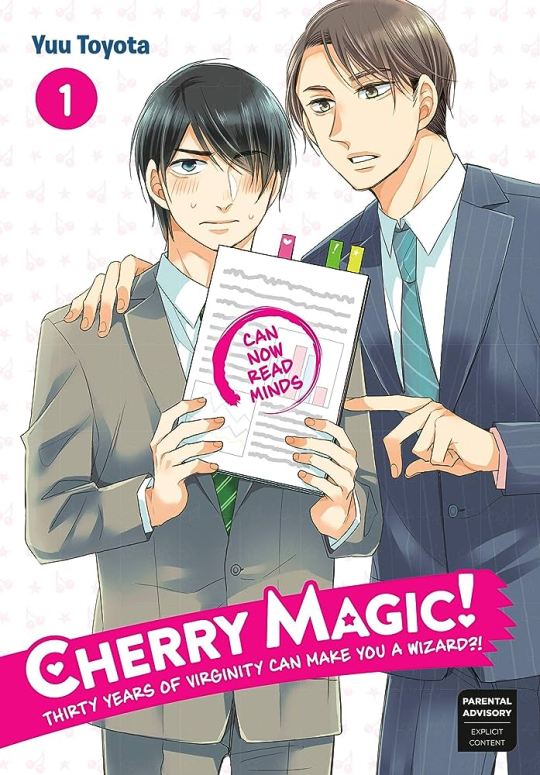
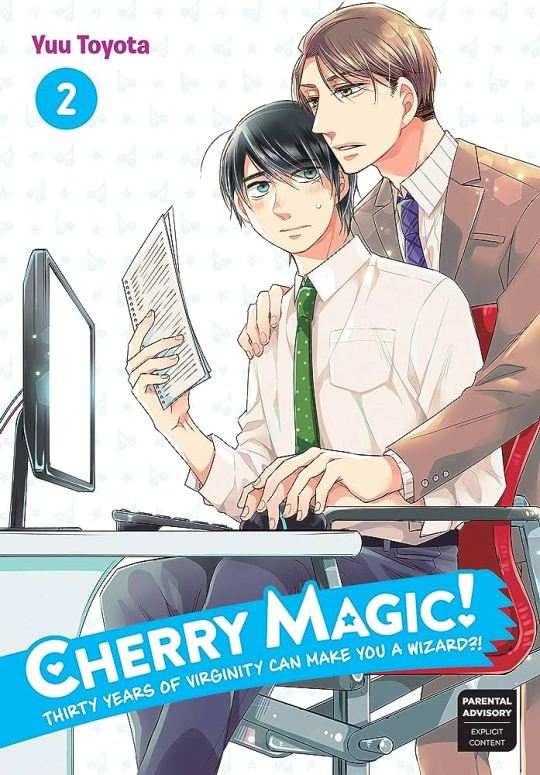
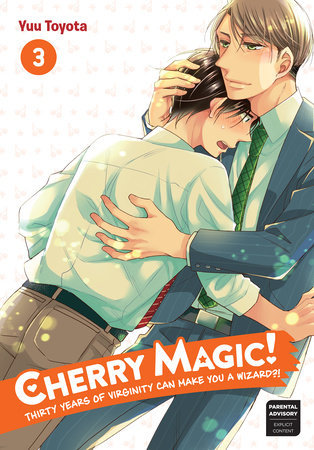
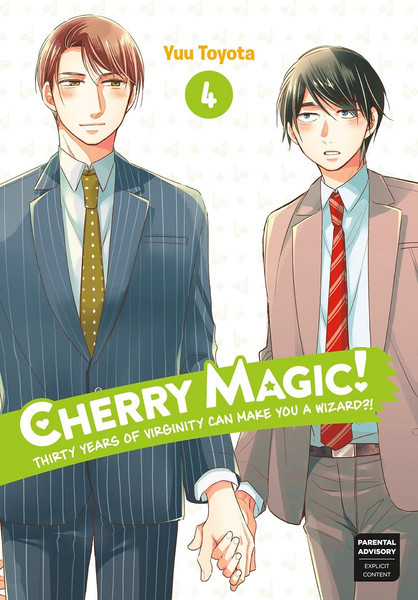
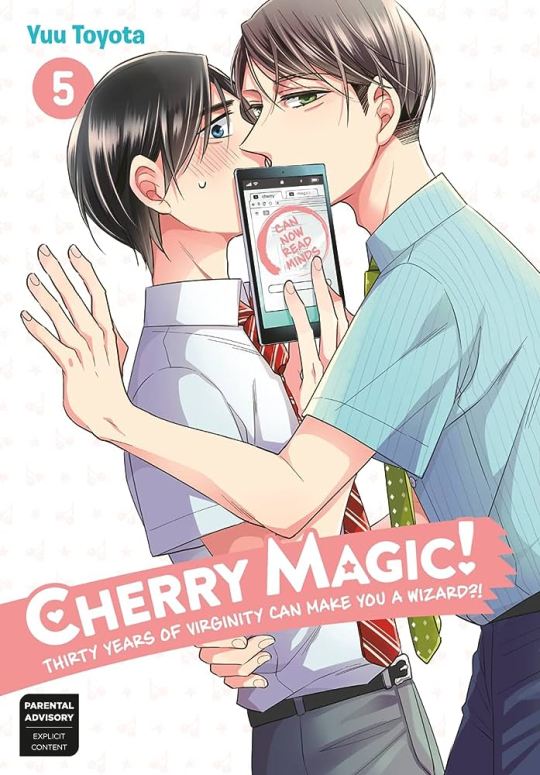
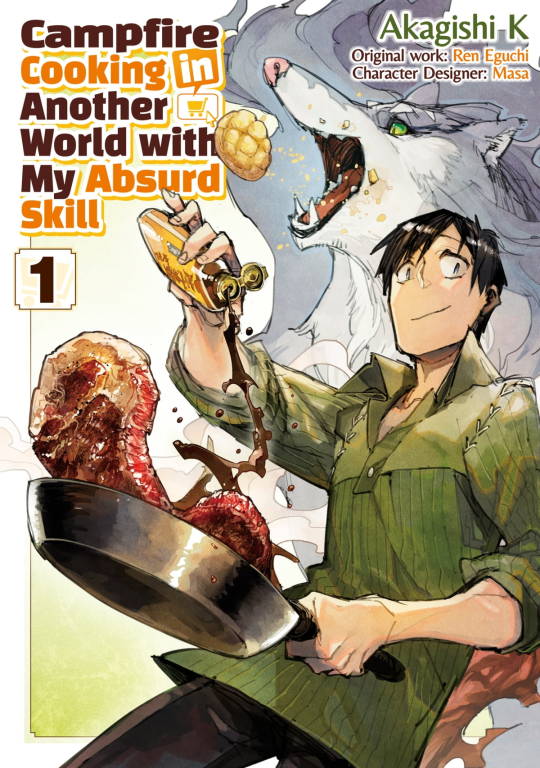
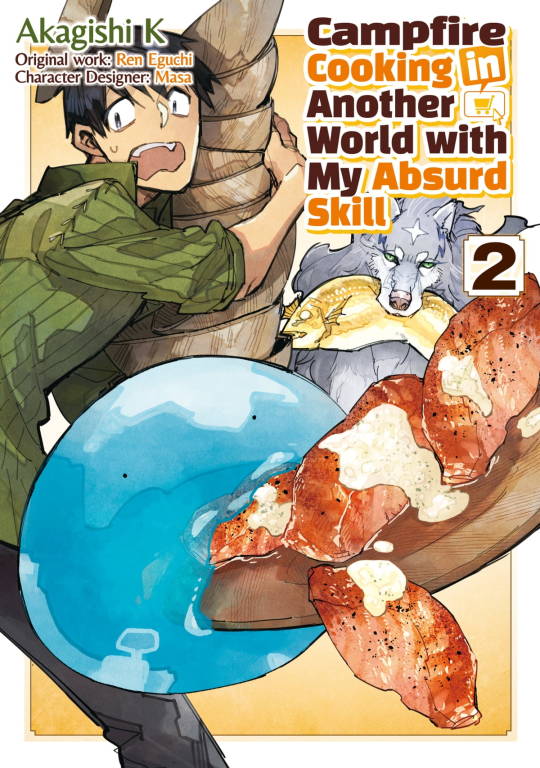
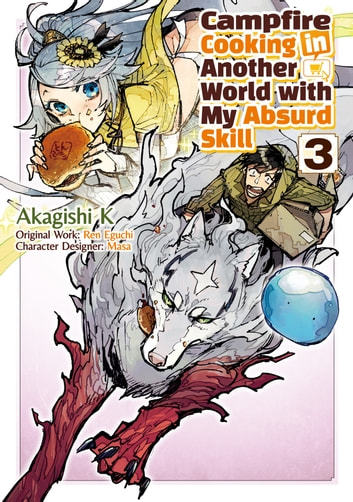
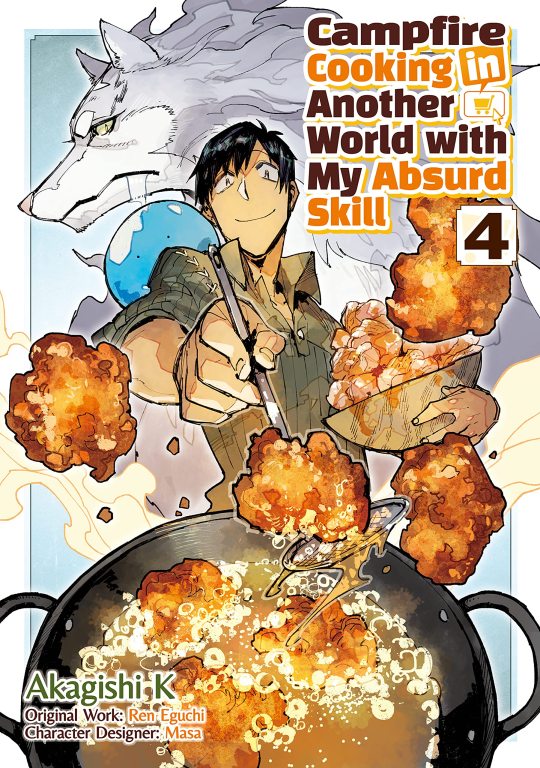
Comics Read in 2023:
Cherry Magic! Thirty Years of Virginity Can Make You a Wizard!? Vol. 1 by Yuu Toyuta (2018)
Cherry Magic! Thirty Years of Virginity Can Make You a Wizard!? Vol. 2 by Yuu Toyuta (2019)
Cherry Magic! Thirty Years of Virginity Can Make You a Wizard!? Vol. 3 by Yuu Toyuta (2019)
Cherry Magic! Thirty Years of Virginity Can Make You a Wizard!? Vol. 4 by Yuu Toyuta (2020)
Cherry Magic! Thirty Years of Virginity Can Make You a Wizard!? Vol. 5 by Yuu Toyuta (2020)
Campfire Cooking in Another World with My Absurd Skill Vol. 1 by Akagishi K. & Ren Eguchi (2017)
Campfire Cooking in Another World with My Absurd Skill Vol. 2 by Akagishi K. & Ren Eguchi (2018)
Campfire Cooking in Another World with My Absurd Skill Vol. 3 by Akagishi K. & Ren Eguchi (2019)
Campfire Cooking in Another World with My Absurd Skill Vol. 4 by Akagishi K. & Ren Eguchi (2019)
[ID: Covers of aforementioned books. End ID.]
#2023media#cherry magic is fun!#a dude is a virgin so on his thirtieth birthday he gains the ability to hear the thoughts of anyone he touches#and as a result finds out one of his male coworkers has a crush on him#idk why it keeps saying parental warning. they have only kissed#anyway its fun times and i enjoyed it but it does fall into some of the yaoi tropes#theres a side character who is a weirdo fujoshi and every time she shows up im like. can u die actually#but overall its genuinely quite fun and enjoyable and i always love when theres healthy gay manga with fucking. adults.#campfire cooking is a silly isekai about a salaryman whose isekai superpower is being able to order things online#from his usual like japanese online market and have them instantly drop into the fantasy world#he loves to cook and ends up forming a bond with a powerful god-beast who wants to eat his cooking sooooooo much#it's lighthearted wish fulfillment about being able to do what u love and found family#i like cooking manga so!#will prob also read the light novel i think#gigi.txt#i have a few more comics i read but not enough to fill a third post i read a lot this weekend
13 notes
·
View notes
Text
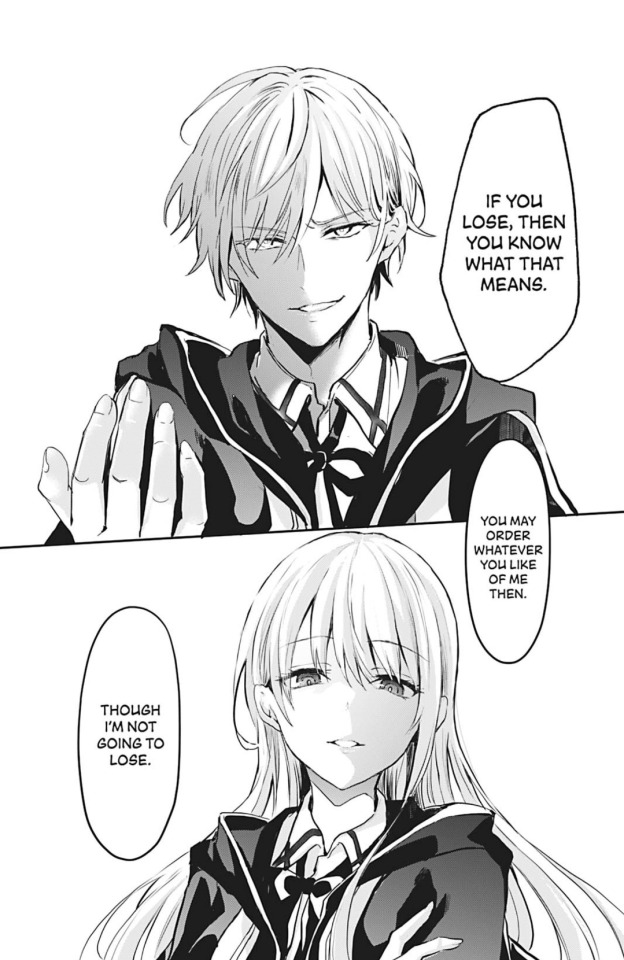
Her Royal Highness Seems to be Angry
Available digitally
#kinda digging this one rn#but the catch is#that idk what the fuck#is going on#so its a manga adaptation#and im loving the art#but i think its missing some stuff???#or its info dumping?#idk but i read 3 volumes#her royal highness seems to be angry#manga#manga recommendation#screencaps#manga panel#shoujo#shojo#fantasy#fyres hyperfixations
2 notes
·
View notes
Text
ok fine i'll get into dungeon meshi
#tbf i was interested even before the anime became a thing#i know spoilers unfortunately lol#but imo if i know some spoilers for a piece of media and still want to watch/read it anyways.. well it sounds genuinely good#i'll start w/ the anime and then read the manga up to the point the anime leaves off maybe :)?#getting into dnd/fantasy again.#balancing out my partners got/hotd love with my lotr+dunmeshi knowledge
1 note
·
View note
Text

did some more art of Ezarae, wanted to try out some color and brushes and am pretty happy with the choices I think
wasnt really meant to be something super long, just trying to get into the swing of this scale again
#oc#my work#2d#illustration#fantasy#sci fi#less manga than normal#gettin nice to try out some brushes tho#science fantasy#I am really loving csp tho now that I am actually using all of the resources it has#aventari#shes going to come at you and make you drink some rotten fish space sauce#the aventari are like space rome but all of the unhinged parts of rome#beeg space lesbian
5 notes
·
View notes
Text
non binary people don’t get no bitches apparently
I just had a discussion with my friend about fanfiction and how we tend to assume that women are the writers without any actual proof. Then I said, hey, I know fanfiction written by gay and trans dudes. But then I remembered, wait, I think I know one writer who just must be cis het based on his work. Anyway, all writers, be honest, who are you?
Please reblog if you're interested in the results.
#I know that some fandoms have a bunch of cis dudes in them#like the hp fandom had so many cis dudes writing power fantasy harem fics lmao#but there were also some pretty richly world builded aus#that’s the fandom where I saw the most cis dudes actually writing fic and not like just making memes and cosplaying and debating or making#really great replicas of star wars ships or whatever#having said that I’ve never been in a manga fandom or anime fandom. do they get alot of dudes?#i do think it’s very interesting#like star wars has just…so many trans dudes and he/they non binary folk#which has been so fun#love my brosefs
25K notes
·
View notes
Text
I have never been dissuaded from ever picking up an author's books so quickly.
But I'm probably not Djanjo Wexler's target audience anyway.
#and like i love me some trashy fantasy and comics and manga#i have fruits basket by my bed rn and a whole shelf of Sanderson lovels and 2 of my 9 bookcases are devoted to manga and comics#but to act like the distionction beyond genre fiction and literary fiction is 'genre is allowed to be fun!'#suggests to me that you either don't read#in which case why would I want to read you#or that you are actively trying to write pulp instead of something interesting#in which case again why would i read you
0 notes
Text
Imagine female Yuu having to cross dress to avoid unnecessary trouble at NRC and Idia finds out through Ortho. Because I can see Ortho finding out if Yuu ever got a minor injury and he was around to play nurse, knowing him he’d do a quick full body scan and find a very high amount of estrogen in her system.
And he blabs to Idia because he’s a snitch who doesn’t keep anything from his brother; if you tell a secret to him, you’re basically telling it to them.
Once Idia finds out, his mind INSTANTLY goes to those otome games and fanfics and gacha life videos about a girl in all boys school. He always thought those were just fun fantasies, but upon seeing that exact scenario happening in real life he becomes curious.
Prior to this, Idia probably wouldn’t think much about Yuu. To him, she was just the odd magicless guy his brother would occasionally run into; the most interesting thing about her was her cat, in his eyes. But now that he knows about her secret, he becomes heavily invested in her school life, he wants to see how this is going to turn out.
He doesn’t exactly stalk Yuu, it’s not like he’s putting cameras in Ramshackle or listening devices in her bag, it’s more like he just pays extra close attention to her when he has the chance, such as during joint classes and lunch. And since Ortho and her are on amicable terms, he encourages Ortho to spill any gossip he learns when around her.
To Idia’s surprise and delight, things end up matching up almost perfectly with what he’s come to expect from these kinds of plots. The ones close to Yuu, who seem to be privy to her secret from what he’s gathered, are all either falling in love or have already been in love. They’re extra protective of her, they’re affectionate and soft with her, and they get jealous when she gives too much of her attention to any one of them.
Idia knows about the overblot incidents, so of course he’d see the pattern in who starts getting closer. Every time someone overblots, Yuu will be there to help and both the overblotter and some other select people in their dorm will begin to fall. It’s a classic pattern.
At this point, Idia would simply see himself as an observer peeking in on this story and, therefore, he can’t be affected by Yuu. He’s not a love target in her story, he’s a side character.
It doesn’t matter that he’s occasionally run in with Yuu and each time he has she’s been a true friend to an introvert like him by making his anxious ass feel comfortable. It doesn’t matter because he’s aware of what’s happening and thus he can’t be affected.
But then he also overblots, and just like before she was there to help pick up the pieces. After that they ended up talking and Idia gets to know more about Yuu, more than he could learn by just observing.
Before long, he’s actually looking forward to seeing her again, to nerding out about his favorite anime’s with her in person because she’s always such a good listener. He’s looking at his manga and game collections and thinking about what she would like.
Idia doesn’t even realize his hearts been skipping beats when she’s around until one day when he’s in class and she walks in. Like a dog hearing their owner walk through the front door, his gaze shoots up and instantly that class gets fifty times more bearable with her around.
…And then he looks around and every other “main character” has had the same reaction.
Which means that he’s also a captured love target, just like them…
Oh how the turn tables for a dating sim loving nerd like himself
#twisted wonderland#twisted wonderland x reader#twisted wonderland x yuu#fem yuu#twst yuu#twst mc#idia shroud#ortho shroud#twst#my rambles#I just love the idea of being freaked out cause#he didn’t expect to be a love interest too
2K notes
·
View notes
Text
New Ryoko Kui interview dropped!!!
(This is a quick and dirty translation made using machine translation, and which I've lightly edited to add clarity. I'm not fluent in Japanese so I may have gotten things wrong. I'm sure others will do a better job later.
ADDITIONAL CONTEXT: This article is from a Japanese gaming magazine, like the previous interview in Famitsu, so they focus on video games and don't discuss other influences, even though they do get mentioned and are clearly pretty major.)
Kui was able to write "Dungeon Meshi" because she was not good at eating food and participating in human relationships. In this interview, we dig deeper into the influence of games, and how Ryoko Kui focuses on things she likes and dislikes while writing. [Writers of the Gaming Generation]
Dungeon Meshi.
This manga is attractive for its unique theme of "dungeons, defeating monsters in the labyrinth, and cooking them," as well as the unique characters, detailed human relationships, and deep worldview depicted in the labyrinth. It is currently being made into an anime, and adventurers from all over the world are fascinated by the world of "Dungeon Meshi."
So I thought , "I wonder if this work was drawn by someone who loves food and people." The depiction of such delicious-looking food and the construction of delicate human relationships and characters. Surely, it must have been drawn by someone who absolutely loves it.
However, in reality, the author, Kui Ryoko, says that she "is not good at either food or relationships."
So why was he able to continue drawing things she was not good at?
During the roughly 10 years of serialization, Kui has continued to confront "things she dislikes." This interview delves into Kui's unique creative techniques... and at the same time, it also delves into her "favorite things."
That's the "game"!
Those who are familiar with the subject may already know this, but Kui is also a big gamer. And it seems that "Dungeon Meshi" is heavily influenced by RPGs such as "Wizardry."
As a result, this interview turned out to be "I asked Kui a lot about her likes and dislikes." Likes and dislikes. They are the source of all interests and curiosity.
So how do we use this knowledge in our creative endeavors? How does this knowledge manifest itself in Dungeon Meshi?
How were those charming characters and the deep world created? We spoke to the original author, Kui Ryoko, and the editor, Masaru Hiroi, about things they could only talk about after the series was completed.
This is a game with the volume of a great labyrinth. I hope you will explore it all the way to the final floor!
Dungeon food. It's eat or be eaten. There is no superior or inferior, to eat food is simply a privilege of the living. Dungeon food. Ah, dungeon food.
First, I want to ask about how Kui first encountered video games.
--What are some influences from games in Dungeon Meshi? What was your first game, Ms. Kui?
Ryoko Kui (hereinafter referred to as Kui): I played traditional RPGs such as [blank?] and "Final Fantasy."
I think the first game console I ever played was a Famicom, which my parents won in a lottery . So before I knew it, we had a Famicom at home. I think my parents bought me the Super Famicom and PS1 after that...
After that, I took a break from games for a bit around the time of the PS2, but around the time of the PS4, I was finally able to buy games with the money I had earned myself .
--Why were you able to stay away from games around the time of the PS2?
Kui: I was too busy with exams, so I thought, "Well, I shouldn't be playing games," and left. When I started living alone after that, I couldn't play games because I didn't have a TV. My computer was also a Mac. [Macs aren't compatible with many games.]
--What was the trigger that made you think, "I want to play games" again?
Kui: I think the biggest thing was starting the serialization of "Dungeon Meshi."
Fantasy stories all have different settings, but at the same time, there are also things they share in common. For example, if you want to create a fantasy work, but you only know "Dragon Quest," it will end up resembling "Dragon Quest." It's scary to copy the setting of only one work.
So I just wanted to play a ton of different fantasy games and get an idea of what the most common general understanding of fantasy is.
--Did you start playing it while you were still developing the concept for Dungeon Meal?
Kui: That's right. If I'm going to talk about "eating food," I have to play a game that has a system for eating food .
So I was interested in "Dungeon Master." However, at the time there was no easy way to play "Dungeon Master" on a real machine, so I played "Legend of Grimrock", which can also be played on a Mac.
["Dungeon Master," is a computer RPG released in 1987. Time passes each time you take an action in the dungeon, such as moving, fighting, or resting, so its biggest feature is that the game progresses in real time according to the player's actions. "Legend of Grimrock," is an action RPG released in 2012. It has a game design similar to "Dungeon Master."]
Until then, I had felt that overseas games and games played on PC were too difficult, but I felt like I had overcome one obstacle there. I thought, "Oh, this is pretty easy," and started playing a lot of different games.
-- Those two games are quite heavy even among RPGs, I think, so did you actually have that much difficulty with them?
Kui: No...I would say that my impression is more that best-selling games are easy to play (laughs).
I'm not that good at games myself, so I usually play games that allow you to adjust the difficulty on a super easy setting. So, games that allow you to lower the difficulty are always a lifesaver.
-- I've heard that apart from RPGs , you also like games such as "13 Sentinels: Aegis Rim" and "Paranomasite FILE23: The Seven Mysteries of Honjo ." Do you have a favorite genre, Mr. Kui?
Kui: I guess I'm just not very good at games that require you to use your brain through trial and error.
But in RPGs, if you just level up and keep tapping, you can win and progress in the game. Also, in novel-type games, if you read the text, you can progress. By this process of elimination, I quite like RPGs and text-based games .
Personally, I like games like Disco Elysium the most, which are text-heavy, top-down, and have maps to explore.
...Even I think that's a pretty negative reason (laughs).
Everyone: (laughs).
Hiroi Masaru (hereinafter referred to as Hiroi): But, Ms. Kui, you have really played quite a lot of games, haven't you?
Kui: No, the reason I'm able to play so much is because I play in a pretty callous way ...
I often buy a game, play it, and then just don't play it. So there aren't that many games I complete... I only complete a few a year. I play around 40 games, and if I complete 5 or 6, that's good.
When I asked if I could draw at Comitia, I got scolded.
-- Have you had any exposure to fantasy outside of digital RPGs?
Kui: I think it's not just games, but also the fact that I've always loved foreign fantasy novels . I was given books like "The Neverending Story," "The Lord of the Rings," and "The Chronicles of Narnia."
-- Dungeon Meshi gives off an atmosphere of Western fantasy like gamebooks or tabletop RPGs, rather than the typical Japanese fantasy games like Dragon Quest.
Hiroi: I think I went to Kui's house before the series started. At that time, we were discussing the name of a sci-fi manga called "Drawing Inside the Brain," which I had rejected many times.
Ms. Kui said she wanted to serialize this sci-fi manga... and when he was on the fourth draft, he said, "No, this isn't going to work," and when I looked at the scribbled notes next to her desk, she had already drawn the original version of "Dungeon Meshi" ! (laughs)
Kui: ……………No, I don't remember much (laughs).
Everyone: (laughs).
Kui: But I had wanted to draw a manga about exploring a dark dungeon, like Wizardry .
Since I was in elementary school, the manga I drew in pencil in my notebooks were all fantasy stories about swords and magic, so I had always wanted to draw a proper fantasy manga. However, there weren't as many fantasy manga in bookstores at the time as there are now, so I wondered, "Maybe fantasy doesn't sell."
Hiroi: At the time, there were a lot of people in their teens and twenties posting fantasy illustrations on online communities for artists, such as pixiv, and Kui was one of them.
I thought, there are so many people who want to write fantasy, so if she writes a fantasy aimed at this generation, it might sell.
And when I saw Kui's notes, I thought to myself, "Let's make a straight-forward fantasy manga, without making it weirdly twisted."
Kui: I originally thought of making this "dungeon exploration manga" as just a hobby... When I asked Hiroi if I could draw it at Comitia first, he got angry.
[Comitia is a comics convention in Japan for original self-published comics.]
Everyone: (laughs).
Hiroi: I said, "If you're going to draw at Comitia, then make sure you draw it as a proper serialization!" (laughs)
However, at that time, Kui had already published two collections of short stories, and they were being reprinted. In other words, she had a certain number of fans even before the serialization began.
So I decided, if Kui creates a pure fantasy for those fans, we can't fail badly. If it doesn't work, we'll just learn that fantasy is difficult to sell after all.
--By the way, were there any discussions between you and Ms. Kui about the fact that fantasy doesn't sell?
Kui: I remember vaguely talking about how fantasy manga doesn't sell well and how difficult it seems. I don't know much about light novels, so that might have been there for a while.
However, since a lot of fantasy manga were coming out around the same time, it was probably a "transitional period ." Maybe it was just when people started to feel more and more like they wanted to draw and read fantasy.
Not everyone is that interested in the things I like
-- I feel that "Dungeon Meshi" is a title that has breathed new life into the fantasy genre. How did you go about creating the setting and world when dealing with fantasy?
Kui: I try to think, "Not everyone is that interested in the things I like."
I like to think about pointless settings endlessly, but there are times when I think , "When this setting is actually made into a manga, people probably won't be interested in this story." So I try to include things that will make people interested, and cut out things that will distract people as much as possible.
For example, in "Dungeon Meshi" I initially wanted everyone to speak various languages. On top of that, I wanted to make the characters "only able to communicate with each other in one language"... but Mr. Hiroi said "Don't do that" (laughs).
Everyone: (laughs).
Kui: Even when I'm drawing it myself, I think, "It takes more than six panels to explain this setting...", and if I explain the setting more than necessary, it slows down the pace of the story.
Moreover, since "Dungeon Meshi" was a monthly serialization, unlike a weekly series, there wasn't much time for extraneous stories. Specifically, I had to draw one episode of about 30 pages per month.
In that case, there was no time to add in settings like "Actually, he was thinking about this behind the scenes" or "Actually, he can speak two languages." So, rather than there being any clear choices, there were quite a few times when "there was no time to do things normally." If it had been a weekly serialization, I might have included more.
--Does the scene where Chilchuck yells insults in his own language feel rather "forced"?
Kui: That's right (laughs).I thought, this only takes one frame...it's my chance [to include information about language]!
--So you haven't thought through all of these "fictional languages" yet?
Kui: If Dungeon Meshi were to be my life's work and I were to spend my whole life creating this world, I think it would be more fun to think about it...but initially, I thought that Dungeon Meshi would end in a few years.
Hiroi: Initially, I said, "It'd be nice if it continued for about five volumes" (laughs).
However, Kui's first draft really had a lot of material... so the editors cut out a lot of it. I understand that it's the parts the readers want to read, but I cut out the parts that deviate from the main story. So it's a battle between the "author who doesn't want to be cut" and the "editor who wants to cut."
--By the way, what kind of discussion took place between the "parts you want to cut" and the "parts you don't want to cut"?
Kui: There were a lot of them every time, but I can't remember them specifically now...it was just small, unimportant details that got cut.
In the scene where the hams made by the Red Dragon go back into the pool of blood, I remember saying, "You don't need these," and they were about to cut them off, but I remember desperately stopping them by saying, "We'll need them later!" I'm glad they weren't cut off.
But once I think of the setting, I want to include things, and then they get cut out, so at first I didn't want to expand the world too much.
I also wanted to complete the story within the dungeon. I didn't want to reveal the name of the country, and I didn't want to give the characters surnames. But in the second half, Hiroi-san told me, "The world is too small, so you should make it bigger," and I was like, "Are you sure?"
--Mr. Hiroi, why did you say that?
Hiroi: As the story progressed, it became clear that "Dungeon Meshi" was no longer just about saving a sister in a dungeon. So I decided that it would be unconvincing if the story had no involvement with the outside world, since what was happening in the dungeon was something that would affect the fate of the whole world.
For example, in real life companies, the more important a decision you make, the higher your superior's rank becomes, right? When I thought about it that way, I felt something was off about the idea of Laios and his friends deciding the fate of the world on their own. "How can they make that decision without anyone knowing about it?"
The fact that the Canary Team was there meant that there must have been a system of reporting, contacting, and consulting here, because that's how "society" and "organizations" work.
In short, I think we were thinking about the situation and asking, "If an organization were to get involved in saving the world, how persuasive could they make it given the society that exists in the story?"
Kui: Well, the plot hasn't changed at all.
From the beginning, I had intended to write a story about saving the world, but I also thought it was possible for the world to be saved by only a select few people in the dungeon who knew the circumstances. Changing it was what Hiroi-san thought would make it more persuasive.
When I was drawing the first half, Hiroi told me, "You don't have to decide anything yet." I was in a hurry to move the story forward and explain the world and story setting, but he told me, "It's better to limit it to introducing the four main characters until about the fourth volume." But in the second half, he said, "Introduce more people and expand the world."
Everyone: (laughs).
Hiroi: Kui-san was like , "That's not what you said originally!" (laughs) But both had meaning...
Kui: I was the one saying, "If we expand the world there, the story will never end, right...?"
After drawing it through to the end, I realized that the balance between holding back and expanding didn't work the way I had expected. I think this is one of the reasons why the serialization of "Dungeon Meshi" took so long.
-- But there are a lot of characters in "Dungeon Meshi," and the relationships between them are complicated. I heard that you also created the relationship diagram for "Taikaishu" [※3] ...
Kui: No, I haven't made one [I didn't do that?]!
[Taikaishu is a full-color web comic by Funako Tsukasa that began serialization on a website in 2005 and is still ongoing. Its unique worldview has earned it a loyal fanbase, especially on the Internet.]
-- Eh? Is that not the case?
Kui: To be precise, I just created an account on the fan wiki.
When I started reading "Taikaishu," I struggled with the complex setting and the large number of characters...and I thought "it would be easier to read if there was an explanation or a list of characters."
So I searched for a bulletin board where readers were sharing their thoughts and asked if there was a summary, but they said there wasn't. So I thought, "Maybe if there was a place where someone with more knowledge could summarize it," and I just made a wiki account.
So I didn't actually edit it. It seems like I've been given credit for someone else's work, and I'm sorry about that...
Dungeon Meshi was created from a sense of guilt about food?
-- "Dungeon Meshi" started off with the catchy theme of "cooking monsters," but little by little the darker aspects and deeper world were revealed. Was the structure of "little by little revealing the darker side" something you had in mind from the beginning?
Kui: I thought I needed a theme to serialize it so I thought I'd try "food education." There were a lot of gourmet manga at the time, but I felt like there weren't many that focused on food education.
-- Considering that the theme is "food education," it makes sense that the nutritional value of the dishes in the story is clearly written down.
Kui: With the theme of "food education," I also thought up a rough outline of the story. Rescue the kidnapped princess, defeat the evil wizard, defeat the final boss, and become king... the framework is pretty simple.
But when I actually tried to proceed with the plan, I realized, "No, this story can't be done so lightly..." At first, I thought I could draw it in a more light-hearted manner.
Hiroi: At first, you were trying to finish the fight against the Red Dragon in one episode, right? I was like, "is that possible?" (laughs).
Everyone: (laughs).
Kui: When I tried to actually tell it in one episode, it ended up feeling like a very brief summary... In order to tell the story I wanted to tell, I had to tell it more thoroughly than I originally thought.
-- Did you have any special thoughts about the theme of "food"?
Kui: No... well... if I had to choose, I'd say I have a strong grudge against food.
Since I was a child, I was a very picky eater, and mealtimes were a pain for me. I hated eating in front of other people, and there was a time when I hated seeing other people eating, so I would look for toilets that were rarely used and eat my meals in the toilet.
When I was doing it, the word "toilet meal" didn't exist, so when the term actually appeared in society I was so happy, thinking "everyone was doing it!"
[Toilet Meals are a social phenomenon in Japan.]
Everyone: (laughs).
Kui: I was thinking, "This is so terrible, right...?" but it was a relief to realize that other people were doing the same thing.
--So what made you choose the theme of "food education"?
Kui: My parents, who were struggling with my picky eating, taught me many things, including the "triple eating" method, but it was no use and I continued to be a picky eater into adulthood. My parents had instilled knowledge about food education in me, but I was not able to put it into practice.
[Kui might be talking about Triangular Eating but I'm not sure.]
So the only thing that remains is that I feel an enormous amount of guilt when it comes to food and eating...
Hiroi: If you think about it objectively, the series starts off on a very negative note.
Kui: But now I've gotten over the habit of eating with other people... or rather, I've come to like it. My editor takes me to lots of delicious places.
--When I was a student, I was trying to leave my udon bowl at school, but my teacher found out and made me eat the packet of udon by myself. There was no soup, and it was really hard to eat the udon by itself.
Kui: It must be tough. I tried to hide it, but my teacher found out and I got really angry.
Hiroi: I've tried to hide it in a drawer before. Then, something dried up came out of the drawer... (laughs bitterly).
How can I draw things I hate?
-- Or rather, is it the fact that you're not good at it that gives you a higher level of insight into the food?
Kui: I think it's because you're interested in it that you either like it or dislike it. Inevitably, you spend a lot of time thinking about it.
Since "Dungeon Meshi" depicts a lot of food, one might think "Do I like eating?", but in fact there are many times when I draw it because I dislike something .
--Aside from food, do you also draw things that you dislike?
Kui: Maybe. For example, human relationships, modern times, fashion...?
-- Perhaps the relationships between the characters in "Dungeon Food" are portrayed so delicately because the author is not good at dealing with human relationships?
Kui: I've always been very curious about things like, "(This person is usually so cold, but has such a charming smile in front of other people)" ...
I feel the same way, but I think people are different in the way they show their true colors. I think it's strange that it stands out to me...
-- I have a simple question. When you draw something you hate, how do you feel? No matter how much you hate something, do you find it fun to draw it?
Kui: The events in the manga don't directly involve me, so I don't dislike the things I'm drawing as much. Also, when I draw while looking for the good parts, it can lead to new discoveries.
Also, I think it's scary to draw only what I like.
In my work, the important thing is "what to capture with the camera," and there's no need to go out of your way to capture filthy things, but at the same time, I think the world will look bigger if you keep in mind that "there are a lot of inconvenient, dirty, and unpleasant things outside the camera." That's the feeling I have when I paint/create manga.
When playing a game, if I have to choose between a game where I only feel like I'm in the world inside the game screen, and a game where I feel like there are lots of people living on the other side of the screen, and that the people in that world could travel anywhere they wanted, I think the latter is more fun to play.
I'm always thinking about how to express that "sense of the vastness of the world" ...and I personally like games that have "a world" to them.
-- Do you ever incorporate elements from the game into your manga?
Kui: On the contrary, I think that is a part that cannot be adopted .
The best thing about games is that each person has a different experience. Games that have lots of endings are also a result screen for what you've done up until that point. When I see something like that, I think, "That's so cool."
Personally, I think that's the game's greatest appeal, and something that could never be replicated in a manga that doesn't have players.
If you're so busy, when do you play games?
-- I'm personally curious, how do you find the time to play games? Even though you're busy with your work as a manga artist, you play quite a lot of games.
Kui: I often use the Steam Deck before going to bed or during breaks between writing manuscripts. In fact, I almost only use the Steam Deck now. I keep it by my pillow, so I can take it and play before going to sleep, or during breaks...
--Is Steam Deck really that convenient?
Kui: I recommend it. The screen is small, but it can run Cyberpunk 2077 .
Also, personally, I've gotten tired of having to turn on my PC to start up a game...with Steam Deck, I can just turn it on and it starts up instantly, even when I'm lying down. How do you writers usually play games? There are times when you have to play games for work, aren't there?
--When it comes to work, I calculate backwards how long I'll be playing before I start playing...If it's a game that can be completed in about 60 hours, I usually estimate that I'll play for 3 hours a day and complete it for 20 days in a row.
Hiroi: It's a lot of work!
Kui: That's amazing... You really are a gamer.
I've always thought that I have a talent for playing games ... but I'm not really good at that. If I'm given a game that's a little difficult, I get tired of it right away, and I'm not very good at trial and error. The range of things I can enjoy is very narrow.
I wonder if game developers around the world are also struggling with the question of "Should I make my games accessible to a wide range of people, even those who aren't particularly gamers?" or "Should I make games that are challenging and can be played deeply?" The same problem exists with manga, too.
When there's a game that I can't play well, I feel happy because it means the creator decided that there's no need to pander to people who can't keep up.
-- By the way, when you play games, do you do it as a normal "hobby"? Or do you play more often to find material for your manga?
Kui: Of course, a big part of it is that I play games as a hobby, but it is alleviated by the fact that playing games might be useful for my work (laughs).
Even if I'm not that interested in a game, if I think "it might be useful for work," I'll find the courage to buy it, and no matter how expensive a gaming PC is, I can still buy it if I think of it as a work tool. So the hurdles for many things related to games are lowered for the reason that it's "for work."
--So, when you read manga, do you feel like you're reading it for work?
Kui: In my case, manga has become my job, so when I read it I can't help but think of work.
However, I still enjoy gaming as a hobby . That's why I don't want to lose this hobby... and I don't think I'll be able to enjoy it as much if I get involved in games as a job, so I don't take on any games-related jobs.
Does the depth of the world come from the fact that it is "not decided"?
-- I heard in advance that "Dungeon Meshi" was written with a clear awareness of "what should be explained" and "what shouldn't be explained," so could you tell me more about that?
Kui: Having read a variety of fantasy novels and games, I thought that the "moment of discouragement" was the "repeated use of foreign words." When you write something like "XX of XX of XX," if there are three or more katakana characters, there is a high chance that it will be skipped over by Japanese readers.
That's why I try to refer to town names as "the neighboring town" whenever possible, and refer to characters who appear in flashbacks as "uncle" rather than by their full names, so that readers can understand without having needing exposition.
The magic used during battles in "Dungeon Meshi" is depicted in such a way that you can "understand what kind of magic it is just by looking at the picture."
-- What other aspects of Dungeon Meshi are there that you deliberately left out of its concrete settings?
Kui: Numbers and language are the settings I avoided touching. For example, just by deciding the month of birth, it is first determined that there is a moon in this world. From there, it is also determined that there is gravity.
What's more, just the concept of a "birthday" means that there is a division into a "year" and that the world is determined to have a 365-day cycle. It quickly becomes complicated.
But on the other hand, if I were to set the details and make it something like "This country's currency is 1 gold, which is worth 5 yen," it would be a burden on the reader. When reading the work, the reader would be forced to convert it into "1 gold = 5 yen" in their minds every time. That's why I try to write it with "readability as a priority" as much as possible.
However, if you're creating a "fantasy" in the truest sense of the word, it would be better to create something that corresponds to that world's calendar or metric system in order to really immerse yourself in that world, so it's difficult to get the balance right...
-- I think that style of "deliberately not giving explanations" is quite amazing.
Hiroi: I think that 's definitely partly because "Dungeon Meshi" is a silly title.
The "mindset" of the reader is a little different...I think that from the very beginning, the reader is made to recognize that "this work isn't going to say anything too difficult."
Kui: Also, we had to give a bit of thought to coming up with the character names.
For example, the main characters in Wizardry are given names that correspond to their professions, such as "Warrior" or "Wizard." The "Senshi" in Dungeon Meshi was taken from that ... I named him after thinking, "I want that person to play an active role."
That's why I wanted the overseas version of Senshi's name to be "Fighter", but I was worried that overseas readers would be like, "What does that mean...!?" so I kept it in my head.
--The character names in "Dungeon Meshi" tend to be around 3 or 4 letters long and fit nicely.
Kui: If the name gets too long, it won't fit in the speech bubble...It's generally said that a line in a speech bubble should be about 7 to 8 characters long to be easy to read.
So "Chillchuck" is really long... I actually thought that the abbreviation "Chill" could be used more, so I named it that way, but it didn't work out so well, so in the end I just kept calling it "Chillchuck". Even I was thinking "that's long" while drawing it (laughs).
Everyone: (laughs).
Kui: Anyway, there are quite a few manga-like circumstances where "maybe four characters would be enough."
--By the way, are there any rules for naming the characters in "Dungeon Meshi"?
Kui: It's not detailed, but there are "settings within the story" and "meta-settings that are just for my own enjoyment."
For example, [if Dungeon Meshi was a game] the Shuro party has names that would be given by a certain type of player. When playing a games, some people give their characters themed names that follow self-imposed rules. In that sense, meta-wise, the Shuro party is played by a player who names their characters with a plant-based restriction.
Also, since the player likes girls, the party members are all girls, and so on... (laughs).
Hiroi: Oh, I didn't know that!
Kuon: ...While it's fun for myself, I also create characters by asking questions like, "Why is the party mainly made up of women?" or "Why do they all have similar names?"
However, even if I revealed these settings in the story, it wouldn't have made the story any more interesting, so they are merely "settings that only exist in my own mind."
-- What are some specific examples of "settings that you deliberately didn't reveal"?
Hiroi: I still remember when I said, "I want you to depict the elven kingdom in more detail," Kui replied, "That's going too far."
The dwarven country was depicted quite a bit, so I personally thought it could have been shown a little more...
Kui: I felt that if I depicted that, it would limit the reader's imagination.
There are definitely "lines that suggest something might happen," and when it comes to parts that are better left to the reader's imagination, I often choose not to draw them.
Also, even when we present settings that readers think they can just skim through, they often try hard to remember them...
It all started with the manga "Eating soba through your nose."
--Let's go back to the topic a little. How did Ms. Kui and Mr. Hiroi meet?
Hiroi: I think we scouted her.
I saw a short story that Kui had posted on Pixiv and sent him an email asking if I would like to draw a manga. I remember that he had a really funny four-frame manga called "Eating soba noodles through your nose ." It was about a character eating soba noodles through his nose and crying out in pain... I think I was drawn to his drawing ability, which made me feel like "Wow, that looks painful" when I saw it (laughs).
And from that point on, we have come to this point.
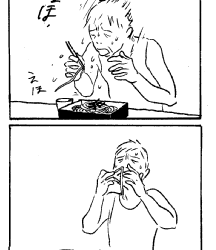
[This may not be the exact comic that Hiroi is talking about, but it's a comic Kui posted on her blog about someone eating soba through their nose.]
Kui: Oh, is that so? Isn't it something like "Shugaku Tenshi" [※4] ?
Hiroi: No, that's not true! The manga about eating soba noodles through the nose was made before "Shingaku Tenshi". By the way, that manga was planned to be published in "Rakugakihon" , but when I asked Kui-san "Can I publish this?", she was very against it...
Kui: No, that's fine, but... I didn't think other people would find it that interesting.
Everyone: (laughs).
Hiroi: But that was more than 10 years ago...
--By the way, was Mr. Hiroi the first publisher to contact you?
Kui: Before that, an editor at East Press had contacted me. I was originally publishing fantasy manga that I had drawn as a hobby on my personal website. I compiled them into a self-published original comic and exhibited it at Comitia, and they asked me, "Would you like to publish this long manga as a book?"
However, after the editor asked around to various people, it seems he was told that "this will be hard to sell"... so the plan was dropped. Instead, it was decided to release a "short story collection" of short manga that had been published at the same time . This is "The Dragon's School is on the Mountain: A Collection of Works by Ryoko Kui" published by East Press.
I was contacted by a few other people as well, but the two people I still keep in contact with are Mr. Hiroi and the editor at East Press.
-- When you went from drawing short stories and web comics to starting a commercial serialization, did you study anything like "how to draw a serialized work"?
Kui: I learned almost everything about how to draw manga from Mr. Hiroi and the editors and writers at Harta .
I had absolutely no understanding of whether panel layout was good or bad, so up until the middle of the serialization, I would rearrange the storyboards one panel at a time, and I would get lectured like "Don't put a panel like this here."
I was also impressed when I was shown original manuscripts by other artists. They look beautiful in print, but the real thing is even more impressive. This is what it means to be good at drawing manga.
It didn't finish as I expected
-- Speaking of "serialization," you mentioned earlier that you initially intended to end it at about volume 5. Did "Dungeon Meshi" continue longer than you had anticipated, Ms. Kui?
Kui: First of all, I didn't really understand what a "serialized" comic meant, so I didn't even know how much of a story I could get done in how many pages. So, I thought I could wrap up the story nicely in about five years, in five volumes.
But I never quite got around to finishing it. It was so hard... (laughs).
Hiroi: To be honest, when I first heard "Volume 5,"I thought to myself, "(Are you kidding me...?)" I didn't say it out loud though (laughs).
--Honestly, even as a reader, around the time of the fight with the Red Dragon in volumes 4 and 5 I was starting to feel like, "Huh? It seems like it's coming to an end soon..."
Kui: From the beginning, my goal was to "defeat the Red Dragon at the halfway point." However, I was supposed to fight the Red Dragon in Volume 4, even though it was supposed to be 5 volumes. So I thought, "Huh? It's not over yet," and I gradually lost interest.
By the time I got to around volume 10, I felt like no matter how much I drew, it would never end. I didn't want to drag it out, but no matter how much I drew, it just never seemed to finish.
Hiroi: Even from an editor's perspective, it seemed like Kui was getting very anxious from around volume 10 onwards.
-- Having finished the long-running serialization of "Dungeon Meshi," did you experience any changes in your mindset?
Kui: I think it was great to have the experience of learning that it would take 10 years to draw a story of this scale. And when I think about my lifespan and how many more works I can draw... it makes me dizzy.
Hiroi: I feel like I'm constantly fainting...
-- Ms. Kui, are there still any works you want to draw in your mind?
Kui: Not that much. But I love drawing manga, so I want to draw a lot. I don't know if I'll have the stamina to continue for another 10 volumes, but I want to continue working as a manga artist somehow.
But maybe... I don't think it will sell that well next time...
Hiroi: Stop! Don't say that!
Everyone: (laughs).
Kui: In that respect, "Dungeon Meshi" sold well, so I was able to draw what I had imagined to the end. Next time, I think it would be better to consider the opposite scenario of "if it doesn't sell" and make it shorter.
That's the next new challenge.
-- In addition to the expectations for your next work, do you feel any pressure?
Kui: In my case, the first collection of short stories I published was fairly well received. For a manga I drew for the first time, that's about it.
That was a relief, but at the same time, I felt that "Ideally, the reputation of my next work will also steadily increase, but there will definitely be ups and downs." If the reputation of the next work is bad, will I be able to continue drawing without getting discouraged? I realized that the "battle with myself" had just begun , and I was terrified when I read the first volume.
What game has cute illustrations, in your opinion?
Kui: This is a completely different topic, but you 've played SaGa Frontier 2 , haven't you? Aren't the pixel art in SaGa Frontier 2 really cute?
--The pixel art in SaGa Frontier 2 is...the best!
Kui: The illustrations in "SaGa Frontier 2" have such exquisite balance... if you try to express that in a picture, you can't reproduce that cuteness. It's like "exquisite head-to-body ratio."
-- In your opinion, Ms. Kui, are there any games that have cute illustrations?
Kui: The first one that comes to mind is definitely SaGa Frontier 2. Also, I still remember how cute the character designs were in Final Fantasy Tactics.
But back in the day, I used to trace characters from FF7 . I thought, "There are so many cool designs in the world..." (laughs).
Hiroi: Nomura (Tetsuya)'s drawings are amazing, aren't they?
Kui: I traced Cloud and Aerith on tracing paper and quietly said to myself, "So cool..." and got really excited. I noticed something while I was working on the "Dungeon Meshi" anime...basically, games and anime are made by many people, aren't they? So I always thought, "Many people must be giving various opinions to make them."
But when I got involved, I realized that one person's power is quite large. This was quite surprising. I thought that there were multiple people who wrote the script and storyboards, and that each person had their own responsibility, but... the power of one person is quite large.
──No matter how much the work is divided up, it's important to have a director or supervisor who brings it all together.
Kui: Yes, in the end, it depends on the power of the person who takes the lead ...
However, at the same time, I think that the division of labor between scriptwriting and storyboarding is something that would never be possible with manga. In the end, you have to create everything in one person's mind, so "bias" inevitably arises. So personally, I don't like the idea of it becoming a "world created in one person's mind."
Hiroi: However, not only in manga but also in novels, the individual author's personality is strongly expressed. I wouldn't go so far as to say "ideology"... but the person's way of thinking is strongly expressed.
Kui: Speaking of which, people who create games alone, such as indie games, are amazing.
It's often said that manga artists "come up with everything, from the art to the story, all by themselves," but I don't think they can compete with independent game creators who create the music, programming, and art all by themselves.
Moreover, even more than manga, no one can give their opinion until the game is completed. If you think about it that way, making a game by yourself is really a "one-man battle." At the same time, what I like about games is that there are quite a few "works that are not made with much consideration for cost" ... I enjoy it a little bit.
-- Do you ever think, "I want to make a game?"
Kui: I once bought RPG Maker , but it ended up being a complete failure... (laughs).
Everyone: (laughs).
Love for "classic RPGs" was a major influence on "Dungeon Meshi"
-- I'd like to ask you, Ms. Kui, since you play a lot of titles on Steam and other platforms, have you ever had any problems playing a game?
Kui: Simply put, a "game that doesn't work" is a problem (laughs).
This sometimes happens with games made by individuals on Steam... they don't have any reviews, so there's no way to deal with it other than contacting them directly. There have been a few times when I've been stuck and wondered, "What should I do?"
Other times, I'll buy a title that just happens to pop up at the top of Steam's rankings. Sometimes I'll play it thinking, "The graphics are kind of cute, so I'll give it a try," only to find that it's incomplete beyond the framework.
--So now people are playing titles that aren't that major.
Kui: Also, when I played Planescape: Torment, which is said to have influenced Disco Elysium.
While playing, I came across a character who was suffering from a terrible curse that made his whole body smell and become sticky. A quest was triggered to ask the NPC who had cast the curse to lift it, but when I asked them to lift the curse, I ended up being cursed with a curse that made me have constant hiccups ...
So when I was walking around the town, the "hiccup" dialogue started popping up all the time. What's more, every time it happened, I would freeze up for about 0.1 seconds. All the dialogue was filled with "hiccups." Anyway, it was a troubling curse.
I had no idea how to deal with this either, so I decided to just kill the NPC who had put the curse on me. The NPC also challenged me by saying, "Maybe if you kill me, the curse will be lifted?", so I tried killing him, but... it didn't lift the curse at all (laughs).
Everyone: (laughs).
Kui: I thought maybe the quest would progress in other places, so I walked around here and there, but the curse was not lifted after all. I was really curious, so I looked back at overseas information exchange thread online, and I found someone had written a lecture that said "You know what happens if you kill an important NPC without thinking about it, right?"
So I realized that this curse can never be lifted again. Even if I wanted to rewind, it was an auto-save, so I had to go back almost to the beginning... I was really... in trouble!
-- But "Planescape: Torment" hits a pretty impressive spot. Was it something that just happened to catch your eye while you were browsing Steam?
Kui: I originally liked games in the same genre as Baldur's Gate, so I think that's how I got into Planescape.
Also, I saw information that a huge amount of text in Planescape was translated by one person... I'm not very good at English, and games like Planescape have a lot of text to begin with, so I'm at a loss if it's not translated into Japanese .
However, when extraordinary people like those who make Planescape use their precious time from their lives to accomplish great things, I feel very grateful.
-- So, Ms. Kui, do you prefer games that are closer to the classics?
Kui: That's right. The first game I played was The Elder Scrolls V: Skyrim, and it was so much fun that I searched for "games similar to Skyrim" and played a lot of the games that came up.
All of them were completely different games from Skyrim, but they were fun. However, I don't like "old games". I think that newer games are generally more polished and well-made.
-- Wizardry, which influenced Dungeon Meshi, is also a classic work.
Kui: When I was a child, I saw my father playing Wizardry V : The Heart of the Maelstrom. As time passed, I remembered that there was a game called Wizardry. The game I played at that time was Wizardry VI: Forbidden Pencil.
I also played Wizardry V , but it was hard to see the map unless I chanted a spell. I was directionally challenged, so even though I had a guidebook at hand, I couldn't progress.
--By the way, were you more interested in making a manga out of "Wizardry" than the tabletop RPG "D&D" ?
Kui: When I was researching fantasy, "D&D" was often mentioned... but I had never even heard of "TRPG" before. First of all, you can't play it without friends, and I was shocked to find out that lots of people have friends they can play with like this...!?
Everyone: (laughs).
Kui: So when I looked up TRPGs on Wikipedia, I couldn't imagine that people actually played this kind of game. I was more confused and thought, "How can people really role-play in front of other people?"
After that, I watched replay videos on YouTube and it was only then that I understood how games like D&D worked.
Games, manga, novels. What is the purpose of all creative works?
-- What was the last game you played?
Kui: Recently I played a school management game called "Let's School." It's made by a Chinese company that also made "My Time at Sandrock."
Hiroi: You really like that kind of game, don't you? (laughs) Oh? Haven't you played "FF7 Rebirth" ?
Kui: I'm thinking about playing the remake of FF7 once it's completed.
Hiroi: No, no, if we don't do it now, we'll never finish it! It'll be a long time before we do it!
--Honestly, I also thought it would take about 10 years for FF7 Rebirth to be released.
Hiroi: I thought it would take about that long too... I really wanted it to be completed while I could still see. So, please do it!
Kui: Once it's finished...I want to play it all at once (laughs).
--Do you and Ms. Kui often talk about games?
Hiroi: Ms. Kui sometimes says, "I want to talk about this game, so I want you to play it." I played "Red Dead Redemption" because of that. Also, a long time ago, Ms. Kui recommended "13 Sentinels: Aegis Rim."
Kui: Whenever there's a game I want to discuss with someone, I always recommend it to Hiroi.
But maybe I haven't been playing games as much lately. Until now, I've been playing games because I thought of it as "for work," but now that the serialization of Dungeon Meshi has ended, I've been playing less games.
Moreover, I'm not the type of person who gets that into one game...I don't generally play through a game in repeated playthroughs, and I'm usually satisfied once I've finished the story.
Hiroi: Then we have to start [a new ] serialization soon.
Everyone: (laughs).
-- I'd like to ask you personally, do you have any "recommended indie games"?
Kui: I highly recommend "Papers, Please" and "Return of the Obra Dinn."
First of all, "Papers, Please" is a simple "spot the difference" game, so I didn't have high expectations at first. But when I played it, I felt like there was a proper "world" to it . Also, I was curious to see how the story continued.
And "Return of the Obra Dinn" had a great atmosphere. There were hints to solving the puzzles if you looked closely, but there was also a good balance of being able to force your way through, and the music and production were cool.
Hiroi: Come to think of it, you read quite a bit of the novel after the serialization ended, didn't you?
Kui: Ah, you mean "1984" by George Orwell? That was good...
I've always thought that creativity isn't necessary for life... It's entertainment, so it's not essential to life. But after reading "1984," I thought, "I guess creativity is necessary after all."
Humans need stories to experience things that should never come true, to prepare for bad things, and to prepare for understanding other people... You might think, "You should have already learned that when you were younger," but I was deeply moved by this realization.
Anyway, I feel that it would be great if people could learn things they didn't know before through this work.
Hiroi: ...Overall, it just felt like we had a fun time talking about games (laughs).
Kui: We just used the interview as an excuse to talk about the game (laughs).
-- No no, thank you very much for sharing your valuable story! (End)
I think I can understand a little bit about being interested in things you hate.
It's easy to analyze "why do you like something?" when you like it, but it's surprisingly difficult to analyze "why do you dislike something?" When you understand the reason, it seems that "why do you dislike it" is often more meaningful.
Perhaps creative works exist in part to help us understand the things we dislike.
I was able to hear a lot of deep "creation stories" that made me think about such things. Also, Ms. Kui is a huge gamer. Mr. Hiroi also likes games quite a bit. Since serious talk and game discussions alternated, the content may have been emotionally confusing. But I feel like "Dungeon Meshi" has a similar atmosphere.
If you haven't read "Dungeon Meshi," please take this opportunity to read it. It depicts a fun adventure. On top of that, it may help you prepare for difficult things that might happen in your life someday. Of course, it's also extremely interesting as a manga. I think it's definitely one of the best "entertainment" of our time.
Why does the body want to live? What does the mind want?
This is because we have a "desire" to pursue what we like and dislike. In fact, "things we dislike" are just as important as "things we like." By understanding our own "likes and dislikes" through creative works and entertainment, humans can prepare for things that happen in their future lives. Food and creative works are equally important for human growth.
...That said, I'm not sure if it has a nice punchline, or maybe not.
To eat. To experience creative works. These are truly the privileges of life. In order to live, we must continue to eat.
Now it's time to eat. What shall we eat today?
1K notes
·
View notes
Text
Mint's TTRPG Library
Here is a list of links to the Collections I add Itch.io games to on the regular, where I often go to in search for games to meet folks' recommendation requests.
These collections are large and unwieldy. I'm not certain that they're easy to navigate, but if you want to do some browsing, you certainly have options!
Systems
Belonging Outside Belonging Breathless Caltrop Core Charge Descended from the Queen Firebrands Forged in the Dark Honey Games (Honey Heist) Into the Odd Lasers + Feelings LUMEN Par-AGON (Paragon System) PbtA Push Together We Go Troika (A bunch of Troika supplements) Tunnel Goons (AKA Goon Games) What’s So Cool About _?
Genre
Adventure - With Pulp! (Westerns, Dinosaurs, Spies, Time Travel) Bittersweet Futures (Post-Apocalypse) Botanical Adventures (Plants) Bring Me The Evidence! (Mysteries) Cogs and Steam (Steampunk) Delicious Delights (Food & Cooking) Dirtpunk (Revolution, Rebellion, Fighting) Eras Both Real & Imagined (Historical, Faux-Historical) Everyone Loves A Competition (Competitions, Sports) Fae and Fen (Faeries & Goblins) Fangs, Fangs, Fangs (Vampires) Grim & Gritty (Gritty & Grimdark Fantasy) Hearts & Threads (Romance) Manners & Mischief (Social & Political) Mechs and Tech (Mechs & Robots) Modern-Day Mishaps (Modern-Day Setting) Monsters & Mutants (Monsters, Monster Hunters, Pokemon - simulators) Neon Lights & Cyber Nights (Cyberpunk) Oh So Anime (Anime & Manga themed) Paranormal Activity (Ghosts, Cryptids, Death) Pastoral & Cozy (Cozy Games, Witch Games) Paws and Feathers and Scales (Animals) Sorcerous Intentions (Magic-Users) Stars and Science (Science-Fiction, Space) Sword & Sorcery & So Much More (General Fantasy) Teenage Hijinx (Teenagers) The Sea Calls (Oceans, Aquatic, Pirates) With Great Power (Superheroes, Magical Girls, Fantasy Superpowers)
Other
Abstract Games & System Bones (SRDs, Genre-less) By Pen and Paper Played (Epistolary Games) Funky Fresh Flavors (Miscellaneous) GM-Less Solitary Adventures (Solo Games) System-Neutral Settings (Adventures & Settings) The Art of Creation (Collaborative World-building) Two Can Play At That Game (Duet Games)
740 notes
·
View notes